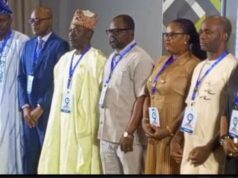
The Court of Appeal in Abuja has refused to recognize Jerry Gana as the presidential candidate of the Social Democratic Party (SDP), and declared ex-Cross River State Governor, Donald Duke as the authentic candidate.
In a unanimous decision by a three-man panel, led by Justice Abdul Aboki, the court set aside the December 14, 2018 judgment of the High Court of the Federal Capital Territory (FCT) which had declared Jerry Gana the candidate of the party.
The court awarded N500,000 cost against Gana and in favour of Duke.
Gana, who came second with 611 votes in the SDP presidential primary held on October 6, 2018 had sued at the High Court of the FCT, challenging the competence of Duke’s participation in the primary in view of the zoning and rotation provision in the party’s amended constitution of 2018.
Gana had contended that Duke, who came first at the primary with 812 votes, was not qualified to become the party’s presidential candidate because, by the zoning and rotation provisions in Article 15(3)(2) of the amended constitution, Duke, a southerner cannot be the presidential candidate while the party’s National chairman was also from the southern part of the country.
According to Gana, under the amended constitution of the party, which provides for the zoning of the major offices including that of the national chairman and president, between South and North, and rotation among the six geo-political zones, a section of the country cannot produce both the national chairman and the president.
In the lead judgment read on Thursday by Justice Aboki, the Court of Appeal held that as at when the SDP’s presidential primary was conducted on October 6 last year, the party’s constitution that was in operation was that of 2011/2012 which did not provide for either zoning or rotation.
The court said although the party’s national convention adopted the amendment to the party’s constitution on October 6 last year, the amended constitution did not become operation until October 8, 2018 when it was registered with the Independent National Electoral Commission (INEC) as required under the Nigerian Constitution.
The court said the FCT High Court ought not to have heard the suit filed by Gana because it was premised on a wrong understanding of the zoning provision in the party’s constitution.
It said the zoning and rotation provisions only apply to positions like the national chairman and president, but not presidential candidate. It said the provision could only be activated if the party’s candidate emerges as a president of the country.
The court said it would have amounted to discrimination and a denial of constitutional guaranteed right for a member of a party to be prevented from contesting for a position solely because he is from a section of the country as the party’s National chairman.
It said the trial court contradicted itself in its January 14, 2019 judgement when, after holding that the amended constitution of the party was not operational as at when all process leading to the presidential primary were concluded, went ahead to void the outcome of the primary.
The appellate court wondered why Gana did not raise the issue before the conduct of the primary. It also wondered why Gana did not challenge the participation of the other three aspirants, who are all from the southern part of the country.
The court, which held that Gana was bound by the undertaking he signed to abide by the outcome of the primary and to support the winner, only challenged Duke because he (Duke) won the primary.
In his supporting judgment, Justice Emmanuel Agim, said Gana was seeking to achieve cheap victory, which he could not get at the primary.
Justice Agim said having signed an undertaking, like every other aspirants, to abide by the outcome of the primary, it was wrong for Gana to have turned around to seek to contest the primary’s outcome.
He said the conduct by Gana was responsible for why the nation’s political space was tense and violent prone.
He said if political leaders learn to conduct themselves with decorum and civility, there will not be need for the unending litigation engaged in by them before and after elections.
Both Gana and Duke were in court throughout the over three hours that the judgment lasted.
Gana, who looked unhappy, bolted out of the courtroom immediately the court rose at the conclusion of the judgment.
He failed to interact with anybody, not even the journalists, who sought his opinion.
Duke, who was happy with the outcome of the judgment, greeted and hugged his supporters and friends who came to him after the proceedings.







